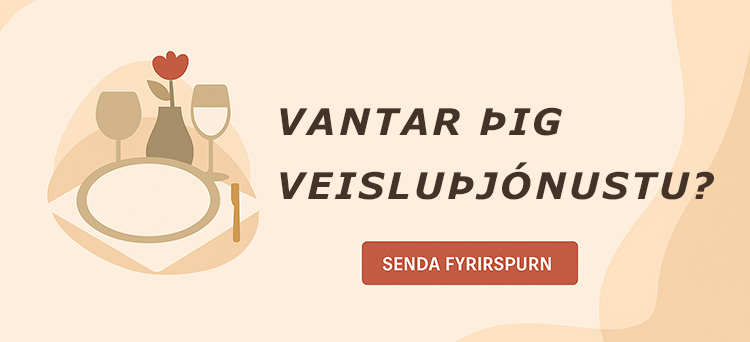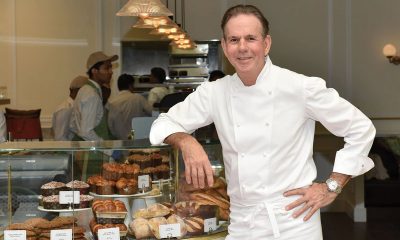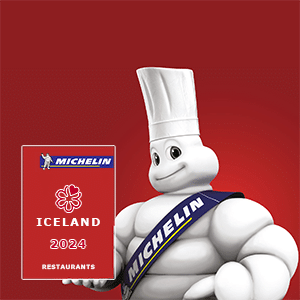Viðtöl, örfréttir & frumraun
Working in one of New York’s top restaurants sounded like a dream
Mario Batali is the most recognised chef in New York, a city with more chefs than any other in the world. In addition to his television show, he has been simply and energetically omnipresent. It would be safe to say that no New York chef ate more, drank more, and was out and about as much.
With his partner, Joe, Batali owned three restaurants and a shop selling Italian wine, and when we met they were talking about opening a pizzeria and buying a vineyard in Tuscany. But Babbo was the heart of their enterprise, crushed into what was originally a 19th-century coach house just off Washington Square. People went there in the expectation of excess. A friend who’d once dropped by the bar for a drink and was then fed personally by Batali for the next six hours went on a diet of soft fruit and water for three days. „This guy knows no middle ground. It’s just excess on a level I’ve never known before – it’s food and drink, food and drink, food and drink, until you feel you’re on drugs.“
Batali’s first job was at a pub in King’s Road, Chelsea. Marco Pierre White was the new chef and Mario became his slave. It’s an extraordinary fortuity that these two men, then both in their early 20s, found themselves in a tiny pub kitchen together. It lasted four months.
Batali then embarked on a grand tour of the grandest restaurants in Europe, tracing White’s skills back to their origins: the Tour d’Argent in Paris; the Moulin de Mougins in Provence; the Waterside Inn at Bray. „You learn by working in the kitchen,“ he said. „Not by reading a book or watching a television programme, or going to cooking school. That’s how it’s done.“
That’s what I wanted to do – to work in the Babbo kitchen, as Mario’s slave. I was accepted on a trial basis. To start, I’d do a night or two plating pasta, plus Fridays in the prep kitchen.
Mario then invited me to attend a Saturday morning kitchen meeting. It was January 26, 2002. Twenty people showed up, gathered round a long table upstairs, Mario in the middle. He reminded everyone of the three essential principles of the kitchen: that we were there „to buy food, fix it up, and sell it at a profit – that’s what we do“; that consistency was essential („If someone has a great dish and returns to have it again, and you don’t serve it to him in exactly the same way, then you’re a dick“); and that the success of Babbo, „the best Italian restaurant in America“, had arisen from its style: „More feminine than masculine. People should think there are grandmothers in the back preparing their dinner.“
The following Friday, at 7am, I presented myself to the prep chef, a handsome, athletic woman in her 40s named Elisa Sarno. I was eager, hopeful, utterly ready. But Elisa didn’t seem all that happy to see me. I put on an apron and jacket, and was given a tour. One corner of the kitchen was taken up by the „walk-in“ – a refrigerated closet about the size of a small truck with floor-to-ceiling shelves. That week’s New York Times restaurant review was pasted on the door, as was the custom – a reminder of the competition and of the importance of Babbo’s three stars (very few restaurants, you learned, were awarded even two). Another corner was given over to dishwashing. Pots, pans and various plastic containers were stored overhead. Elisa was describing each one according to its size. „These are the one-quarts, and here are the two-quarts, four-quarts, six-quarts, and eight-, all with their own colour-coded lid. Hotel pans and half-hotels are there, along with sheet trays and half-sheet trays.“
I was thinking about the private autistic language of the kitchen – is this what you learn in cooking school, what a hotel pan is? – when Elisa suddenly stopped. „Where did you put your knives?“ she asked.
„My knives?“
„You don’t have knives?“
„I’m meant to have knives?“
„Oh my God. OK, bring them next week.“ She muttered to herself: „God, I hate lending people my knives.“ She led me into the walk-in, talking very fast now, wanting to get on with her day. „This is where we put stuff for the grilling station“ – she pointed to a shelf packed with green-lidded containers, indistinguishable from all the other shelves, also packed with green-lidded containers. „This is the pasta shelf. This, the pantry shelf. This, the sauté shelf. Oh, yes, and this is the masking tape. Everything is labelled and dated. Where’s your pen? You didn’t bring a pen?“
Vegetables were in the back – crates of carrots, celery, white onions. Fish had been stacked on the floor, delivered before I arrived, some silver Mediterranean monstrosities.
„Time to bone the ducks. Come.“ There were four boxes of ducks, six in each box. „Unpack the duck from the top, so you don’t get blood all over you. Remove the gizzards. Liver goes in one container, kidneys in the other. Remove the legs to make a confit, but first chop off the knobby bit at the bottom with a chopper – here, use this,“ she said, handing me a giant tomahawk, „and then remove the breast. You do know how to bone a duck, don’t you?“
„Well, I think, yes, I do. I mean, I’ve done it.“ But when? I seem to recall a dinner party. Was that in 1993?
„And you know about the oyster of meat?“
„The oyster?“ In a duck?
„Yes, it’s the nugget of meat you don’t want to lose. It’s here,“ she said, swiftly cutting the breast in half and whipping her knife round the thigh. She had an appealingly easy manner with the knife, which seemed to involve no effort, and the meat instantaneously cleaved in two. I was thinking, I want to learn how to do that, and ended up not quite getting the location of the duck oyster – was it in front of the thigh or behind? – when she had left. A delivery man had appeared, bearing boxes of meat.
I picked up a duck, removed the wings and hunted around for that oyster. I felt an obligation to honour this bird in my hand by ensuring that its thigh oyster found its way on to the plate. But where was the little fucker?
I looked across to one of the cooks, who seemed to be boning quails, a much more challenging operation. And he was doing it at staggering speed. The delivery man was staring at me – was he actually shaking his head? – when, somehow, I dragged the blade of Elisa’s knife, smoothly and delicately, across the top of my forefinger, from behind the first knuckle to the nail. There was a moment: did I just do what I think I did? Yes. And the top of my finger erupted in a gush of red blood. „Did you just slice yourself?“ Elisa asked, breaking off from counting lamb shanks and in a tone that said, you’ve been here half an hour, and this is what you’ve done?
„Yes,“ I said, „but not to worry.“
„Do you need to go to the hospital?“ It sounded like an accusation.
I shook my head, a little worried by her worry. There was a lot of blood.
„Band-Aids are in the refrigerator,“ she said. „You’ll need to wear a rubber glove. The Band-Aids won’t stay dry.“
I came to regard the prep kitchen as something like a culinary boot camp, especially during my first weeks when I was being taught the basic techniques of being a cook, especially knife skills. It seemed that I’d been using a knife for years without knowing how to use one. On that first morning, I paused to sharpen my knife – well, Elisa’s knife, actually – and she stopped what she was doing and stared: I was doing it backwards (ergo, I had always been doing it backwards). Then there was the rocking thing. The idea is that, when you’re chopping food, you want to leave the tip of your knife in place, on the cutting board: you end up rocking the knife back and forth, and the blade then slides effortlessly, and with much more control, through whatever it is you’re chopping. Everyone who cooks probably knows this; I didn’t.
I cubed pork for a ragù (only after my first batch was returned – „These are chunks, I asked for cubes“) and learned how to trim the fat off a flank of beef. Jointing rabbits, I was taught how to tie up the loin with a butcher’s looping knot and was so excited by the discovery that I went home and practised. I told Elisa about my achievement. „I tied up everything,“ I said. „A leg of lamb, some utensils, a chair. My wife came home, and I tied up her, too.“ Elisa shook her head. „Get a life,“ she said and returned to her task.
Until now, my cooking had been based on what I got from books. I hadn’t worked in a professional kitchen and had always respected those who did. They knew something I didn’t. Now I was among them. In effect, I had entered into a contract: I was indentured. In the mornings, I gave Elisa my time and she gave me instruction. To my astonishment, she took me seriously.
The Babbo kitchen was actually several kitchens. In the morning, this small space – the work area is about 25ft by 10ft – was the prep kitchen and run by Elisa. In the evenings, the same space became the service kitchen and was run by Andy, the executive chef. But between the hours of 1pm and 4.30pm, the different kitchens (more metaphors than places) overlapped.
Andy was the first to show up, a minute or two after noon, respectfully not wanting to disturb the morning authority structure. Memo, the senior sous chef, arrived an hour later. Frankie, his junior, was next. And then the others, one after another, late risers all, buzzing with their first coffee, smelling of soap, their hair still wet. The last was Nick Anderer, the „pasta guy“.
By now there were 18 to 20 people in the kitchen. In the afternoon, if you can get a perch in the kitchen, you don’t leave it. You don’t answer the phone, run an errand, make a cup of coffee, have a pee, because if you do, you’ll lose your space.
Mario flits between the shifts, unpredictably. He no longer runs the kitchen – he sneaks up on it to see that it’s functioning properly or he will simply visit it when the spirit moves him – but the public expectation is that he’s there every night, preparing every dish, an idea that he reinforces, flamboyantly rushing out plates from the kitchen to special customers.
In the evenings, I started plating pasta. „Like this,“ Mario said. He took my tongs before I could plate a spaghetti and dropped it slowly from up high. „You want to make a mound of pasta and give it as much air as possible.“ And, later, with tortelloni: „You want only a splash of sauce. It’s about the pasta, not the sauce“ – a maxim I’d hear over and over again, distinguishing the restaurant’s preparation from an Italian-American one. (In red sauce joints, the dish is less about the pasta and more about the sauce, as well as the ground beef in the sauce, plus the meatballs or the sausages or both the meatballs and the sausages, as well as the peppers, the pickled onions and the chilli flakes.)
Later, Mario explained the components of the tortelloni. The tortelloni was a soft, pillowy pasta, stuffed with goat’s cheese and served with dried orange zest and a dusting of fennel pollen, which was like an exaggerated version of fennel. And the orange peel? Because orange and fennel are a classic combination. They also give some bite to a soft, unacidic dish.
Until now, I had thought I was acquainted with the Babbo menu. I could recommend dishes: the pappardelle – to die for; or the so-called Two Minute Calamari, Sicilian Lifeguard-Style – spicy, don’t miss it. I knew nothing. In the blue Babbo bible, I counted 50 pastas. There were 60 entrées, 40 starters. The menu was four pages long.
The line cooks were moving so fast that I couldn’t follow what they were doing. Orders were coming in on a ticker-tape machine, a long paper stream, one after another. There was an aggressive forthrightness as cooks dealt with the heat and fire, long flames flaring out of their pans; and then an artistic delicacy as they assembled each plate by hand, moving leaves of herbs and vegetables around with their fingers and finishing it by squirting the plate with coloured lines of liquid from a plastic bottle, as though signing a painting.
Mario was examining the plates going out. It was one of his surprise visits. He eyed a skirt steak and addressed Mark. „Grill guy, your salsa verde is breaking up. You’ve got too much oil in it, and the plate is too hot. Replate.“ Mark replated the dish, his movement miraculously accelerated, like a video on fast-forward. „I’m counting. Ten. Nine. Eight. Seven… If I can hear you talking, you are talking too loud.“ The kitchen was like a library. Mario studied a dish from the sauté station, the duck, stuck his finger into it and tasted. „Dom, take down your sauce.“ It was too salty, needed diluting. „And the duck,“ he said, picking up a slice of the breast. „You want to give the fatty side an extra minute. The meat is fine.“ It was verging on rare. „But render more of the fat.“
An orecchiette [little ear-shaped pasta] was returned from the dining room, half-eaten, the plate borne into the kitchen by the maître d’, John Mainieri, who explained, „There are not enough florets on the broccoli.“ Five people gathered around the plate and started eating from it. „He says that the last time he ate here, the broccoli had more florets.“ Everyone picked out a floret and stared at it closely. „It’s true,“ Mario said. „We’ve had larger florets, but nature isn’t making big florets at the moment.“ A new pasta was prepared and Mario handed it to one of the runners. „When you give this to him, please pistol-whip him with your penis.“
Half an hour later, another return from the same table – this time, from a woman. A steak. It was chewy. „She doesn’t want a new dish. She wants steak, properly prepared.“ The cooks assaulted the meat, indignantly tearing off pieces with their hands, and turned to one another, saying, „Chewy?“ The steak came back. Now, evidently, it had been overcooked. And there was also a chop. It, too, was not satisfactory. „For fuck’s sake. Find out their names. They’re not coming back.“ Mario paused. „What are they drinking?“
„A Solaia 1997.“ A bottle was $475.
„Forget it,“ Mario said and ordered another round of entrées.
I once asked Mario what I could expect to learn in his kitchen. He thought for a moment. „You develop an expanded kitchen awareness. You’ll discover how to use your senses. You’ll find you no longer rely on what your watch says. You’ll hear when something is cooked. You’ll smell degrees of doneness.“
From the start of the day to the end, the place was frenzied. In fact, without my fully realising it, there was an education in the frenzy, because in the frenzy there was always repetition. Over and over again, I’d pick up a smell, as a task was being completed, until finally I came to identify not only what the food was but where it was in its preparation. The next day, it would be the same.
One morning, Elisa went out to deal with a delivery and I picked up a change in the way the lamb shanks smelled. They were browning in a large pan about 10ft away and I walked over, trance-like, turned them, and resumed my task. My nose had told me that they were sufficiently browned and would be ruined in a minute. By the time Elisa returned, I’d removed the shanks and thrown in another batch. She looked at me, slightly startled.
It was a modest breakthrough and I was allowed to cook. The first item, appropriately enough, was lamb shanks. They were followed by beef cheeks, both basically cooked in the same way: browned and braised in a wine-based liquid until they fell apart. Then duck thighs, rabbit ragù, beef tongue and guinea-hen legs. Working alongside Mario one evening, I asked a question that would change my life. I recalled a suggestion he’d made, that at some point I might try being a line cook. When can I start, I asked.
„What about now?“ He addressed the grill cook. „Mark, move over. As of tonight, you’re training a new person.“
The grill station is hell. You stand at it for five minutes and you think: so this is what Dante had in mind. It is in a dark, hot corner – hotter than any other spot in the kitchen; hotter than anywhere else in your life. Recently, air-conditioning was installed in the kitchen, but there is none over the grill during service: how else can it maintain its consistent hot temperature? The light is bad. What light there is seems to come from the flames themselves: they are lit about an hour before service starts and remain burning for the next eight hours.
I felt the sudden rise in temperature as a crackling sensation on my skin. Close up, Mark reminded me of a person from another era. His hands had a 19th-century griminess. His forearms were hairless and ribbed with purple burns. He smelled of sweat. Mark described the station. There were two cooking devices besides the grill. An oven was to your right to finish the cooking of large items, such as a three-inch-thick steak, and a flat-top was to the left for preparing the contorni – the accompaniments, the rest of the stuff that went on the plate. Mark gestured behind him at a display of nearly a hundred different small trays of food: herbs, green beans, artichoke hearts, beets, and who knows what else – lots of red and green and yellow. I took them in and thought: never in my lifetime. I looked back at the corner. I was hemmed in by heat. „Watch your jacket,“ Mark warned. „If you have your back to the grill, the threads melt and stick to your skin.“ He proposed dividing the duties: he’d do the plating and I could run the grill.
I was thrilled. Didn’t this mean I would be cooking all the meat in the restaurant? (Didn’t it also mean I wouldn’t have to learn the contorni?) Mark explained the drill. Because meat needed to rest, it was cooked the moment an order came in, even if it wasn’t needed for another hour. (Later, when the order was „fired“, the meat would be rapidly reheated and plated.) Orders were called out by the expediter and the person at each station shouted them back in confirmation. „Two Chinos,“ Andy would say, the kitchen shorthand for the pasta-tasting menu, and Nick would answer, „Two Chinos.“ Or Andy would say, „Followed by Love, Sweetie, Butt,“ meaning that the next course was a pasta called Love Letters, an order of sweetbreads and a halibut, and the pasta chef would answer back, „Love“ and Dom, the sauté chef, would answer, „Sweetie, Butt“ – a sequence of words that, if listened to with any detachment, seemed to constitute a narrative in its own right. Or: „Bar loser, tender,“ which meant there was a person at the bar alone (the loser) who had ordered a pork tenderloin.
I had been at the grill for two months when, in the kitchen’s phrasing, I was „hammered“. It was June, 93 degrees outside. Inside? Who knew. Hotter. I was told to line up pitchers of water. „Get ready,“ Frankie said: when it gets hot, everyone orders from the grill. (Why? Because the method says „rustic, outdoors, Italian“? Or because people know that the food comes from the hottest part of the kitchen – let’s make the grill guy suffer?) At 5.30pm, there was the sound of the ticker machine. „Game time,“ Memo said. Nearly 250 people were expected. It turned out to be more, and the biggest number arrived in the first 90 minutes.
One of the mysteries of a restaurant is that there is one thing that everyone seems to order, and you never know what it’s going to be. One night it was two things, duck and branzino (sea bass), and Dom and I were the busiest cooks in the kitchen – there were 25 branzinos and 23 ducks. It was a hot night; I understood the appeal of a grilled fish. But why duck? One evening, it was rabbit. Tonight, it was lamb chops. „Ordering branzino, two lamb medium, one lamb well done, one lamb m r,“ Andy called out.
I answered, „Branzino, two lamb medium, one well done, and one m r.“ Why, I remember thinking, does one go to an Italian restaurant and order lamb chops? They are served on Jerusalem artichokes (sliced paper-thin and sautéed) and topped with red onions (cooked in beet juice for extra colour), mint leaves and lemon zest, with a spicy yogurt secreted underneath: that is, all the elements you’d expect from a Mario dish. But they were, finally, just lamb chops.
At one point, fat from the chops began to pool hotly under the grill. Then it caught fire. There was so much fat that Memo told me to let it burn – it was the only way to get rid of it: just avoid the flames when I was cooking. The bottom of my grill, the part I was always having to lean over, was now on fire. Then the orders came, one after another.
„Ordering!“ Andy sang out. „Two lamb medium, squab, tender, rib-eye.“ I spun around, dipped into the lowboy, loaded up, spun back, dropped the meat on to the raw tray and seasoned it. I lined up the chops on the grill in two rows of five, all pointing to the right, flopped the tenderloins into another corner, put on the rib-eye, but hadn’t got to the squab when I heard the ticker tape: „Ordering three branzino and two lamb medium.“ The same routine: another two rows of chops pointing to the right but in a different spot from the first batch (which I had turned and were pointing to the left), because these were medium rare. But what was I to do with the branzino? There was no room.
The ticker tape again. „Ordering three lamb medium, branzino, rabbit.“ More? I stopped what I was doing – I had to get the new orders on the raw tray to season them, at least that, because otherwise I was going to forget them with the next batch of orders, and if I fell behind I’d throw the kitchen into chaos. Uncooked meat was stacking up because there was no room on the grill. I noticed that Memo had taken up a position nearby, waiting to jump in if I got overwhelmed: what the kitchen calls „the meltdown“ or „the crash-and-burn moment“.
Again the ticker tape. This was starting to feel like a sporting event. Sweat was running off my nose and I was moving fast, as fast as my concentration allowed, flipping, turning, poking, being burned, one row pointing to the right, another to the left, poking again, stacking up meat here, rushing over the branzinos that had been waiting for a spot, turning, the flames in the corner of the grill still burning, fed by the fat cascading off the new orders. Again the ticker tape. My mind was at full capacity, with only one stray thought, a question, repeated over and over again: What happens if I fall behind? And still there were more: lamb medium, lamb m r. What’s wrong with these people? I was surrounded by meat. Meat on the grill. Meat on the seasoning tray. Meat on the resting tray, in big heaps. So much meat that it no longer seemed like meat.
„This is the buzz,“ Memo whispered, still behind me. „This is what you live for,“ Andy said, picking up plates from the pass, adding, mysteriously, „It feels really fucking good.“ And the remark remained in my head for the rest of the night, and I thought hard about what I was feeling: exhilaration, fear, weirdness, some physical-endorphin-performance thing. But good? It was, I concluded, my first glimpse of what Mario had described as „the reality of the kitchen“ – a roomful of adrenaline addicts.
I became a grill guy. During this time, Mario hadn’t been in the kitchen. He was away, promoting something, and by the time he returned I’d been a grill guy for nearly a month. Maybe I’d got cocky. Maybe I needed to be put in my place, but on his first night back he fired me from the line. I’d cooked two pieces of meat incorrectly. The plates were sitting on the pass.
„Your pork is undercooked,“ Mario said, peeling away slices of a loin and judging them to be too rare. „Replate.“ He handed me the dish. „And your rabbit“ – he pressed the white fleshy loin between his thumb and forefinger – „is overcooked.“ The pork could be fixed by putting it under the salamander, an overhead grill that is used for reheating and flash-cooking, although it wasn’t ideal: the result, while no longer pink, was an unappetising grey. But the rabbit was beyond repair and was handed to a runner and served anyway. Mario called over Memo and Frankie and spoke to them with his back to me, an inaudible mumble except for one word: „Unacceptable.“ He then disappeared into the restaurant. Memo, who had been previously doing something in the walk-in, came over and told me to step aside.
„It’s not what I would do. It’s what my boss told me to do.“ He then assumed the duties of my station. There wasn’t a place for me to step aside to. I was in a quandary. Should I go home? For the next hour I considered the prospect. It was a long hour. I was pressed up against a hot oven. People were hurtling past me purposefully. The pantry guy used the grill to reheat his octopus, and I had to squish myself against the oven to stay out of his way. Finally, in an attempt to be useful, I started seasoning the meat that Memo cooked: that was my job – the salt-and-pepper guy. I reflected: if I walked out, it would be tantamount to saying I can’t take it. I wouldn’t be able to return. I seasoned more meat.
The kitchen had grown quiet. No one made eye contact with me. This explicit public dressing-down, the look-at-him-he-fucked-up spectacle of it all, made everyone uncomfortable. Had that been deliberate on Mario’s part – to create dissonance, to remind everyone that there are no friends, only results? Had I got too chummy? Then Mario reappeared. (Shit. Now what?) He went to one of the flat-tops and began making pizzas, „griddle pizzas“, the kind he intended to serve at his new pizzeria. The pizzas were his current obsession and he wanted someone in the restaurant to taste one.
He made several, topping them with gobs of white pork fat and hot chilli sauce, a squishy, melty concoction. Mario took a bite of one and it ran wetly down his cheek, a glistening red-hot rivulet of grease. He then marched over to my corner and shoved the rest of the pizza into my mouth – quickly and with force. „This,“ he said, „is the taste America is waiting for.“ He was inches from my face. „Don’t you think this is the taste America wants?“ His head was tilted back, like a boxer’s, giving me his chin but protecting his nose. He stared at me, waiting for me to agree. „This,“ I said, „is what America is waiting for.“
Satisfied, Mario took his pizzas out to his guests and went home, whereupon Memo ordered me back to the grill. „Mario is gone,“ he said, „and you have to get back your touch.“ It was a profoundly sympathetic act – generous, rebellious, correct – and, like that, I returned to the team.
Frankie explained. „It’s happened to all of us. It’s how you learn. It’s the reality of the kitchen. Welcome to Babbo.“
· Bill Buford went on to be a pasta cook and run the grill alone at Babbo. He quit his desk job at the New Yorker and spent more than a year in Italy, learning about meat and how to hand-make pasta. He became so proficient that Mario Batali suggested he open his own restaurant in New York.
· This is an edited extract from Heat, by Bill Buford, published by Jonathan Cape at £16.99. To order a copy for £15.99, including mainland UK p&p, call 0870 836 0875
Source: The Guardian

-
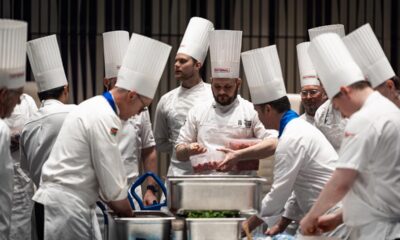
 Viðtöl, örfréttir & frumraun4 dagar síðan
Viðtöl, örfréttir & frumraun4 dagar síðanMyndaveisla frá hátíðarkvöldverði Klúbbs Matreiðslumeistara 2026
-
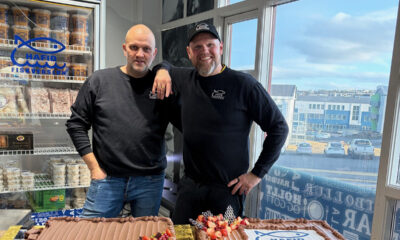
 Markaðurinn2 dagar síðan
Markaðurinn2 dagar síðanEyjó og Dóri mættu með afmælisköku – Hafið fagnar tímamótum
-
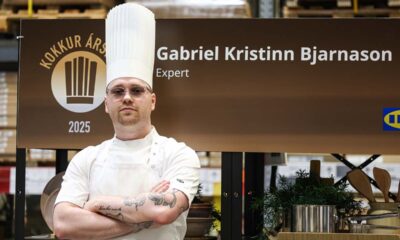
 Keppni2 dagar síðan
Keppni2 dagar síðanKokkur ársins 2026 og Grænmetiskokkur ársins 2026 fara fram í IKEA í mars
-
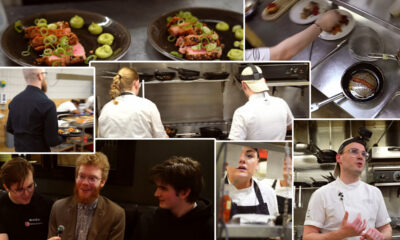
 Viðtöl, örfréttir & frumraun10 klukkustundir síðan
Viðtöl, örfréttir & frumraun10 klukkustundir síðanMyndband: Kokkar tóku á móti gestum í sal á meðan þjónar fóru í eldhúsið
-
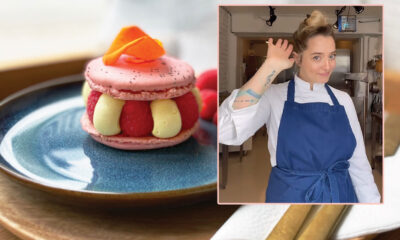
 Uppskriftir2 dagar síðan
Uppskriftir2 dagar síðanAurore hjá Sweet Aurora deilir uppskrift með lesendum veitingageirans
-

 Frétt4 dagar síðan
Frétt4 dagar síðanTilkynning frá Suðurnesjabæ vegna umfjöllunar um Sjávarsetrið
-

 Keppni3 dagar síðan
Keppni3 dagar síðanFreyja Þórisdóttir stóð uppi sem sigurvegari í keppninni um Bláa Safírinn – Myndir og vídeó
-

 Vín, drykkir og keppni1 dagur síðan
Vín, drykkir og keppni1 dagur síðanStemningsmyndir frá Kalda bar þegar tilnefningar BCA voru kynntar



